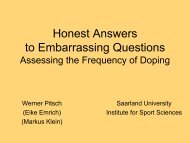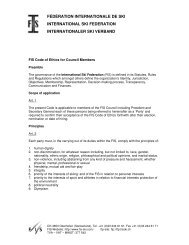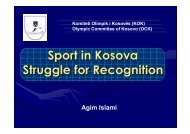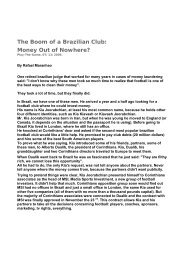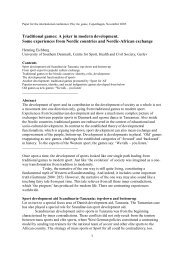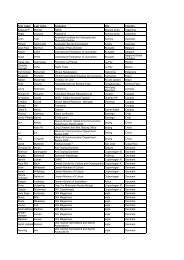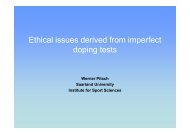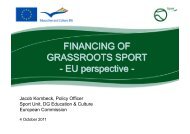Sports Governance Observer - Play the Game
Sports Governance Observer - Play the Game
Sports Governance Observer - Play the Game
Create successful ePaper yourself
Turn your PDF publications into a flip-book with our unique Google optimized e-Paper software.
Action for Good<br />
<strong>Governance</strong><br />
in International <strong>Sports</strong><br />
Organisations<br />
www.aggis.eu<br />
play<strong>the</strong>game.org
Action for Good <strong>Governance</strong> in<br />
International <strong>Sports</strong> Organisations<br />
This leaflet is published by <strong>Play</strong> <strong>the</strong><br />
<strong>Game</strong>/Danish Institute for <strong>Sports</strong><br />
Studies on <strong>the</strong> basis of <strong>the</strong> report<br />
‘Action for Good <strong>Governance</strong> in<br />
International <strong>Sports</strong> Organisations’<br />
by <strong>Play</strong> <strong>the</strong> <strong>Game</strong>/Danish Institute for<br />
<strong>Sports</strong> Studies, University of Leuven,<br />
Loughborough University, German<br />
Sport University Cologne, Utrecht<br />
University, Swiss Graduate School of<br />
Public Administration, University of<br />
Ljubljana and <strong>the</strong> European Journalism<br />
Centre.<br />
Published by: <strong>Play</strong> <strong>the</strong> <strong>Game</strong>/Danish<br />
Institute for <strong>Sports</strong> Studies, Copenhagen,<br />
Denmark 2013<br />
ISBN: 978-87-92120-58-8 (printed)<br />
978-87-92120-59-5<br />
(pdf edition)<br />
Photos: Thomas Søndergaard,<br />
Periskop<br />
Layout: Anne von Holck,<br />
TegnestuenTrojka<br />
The AGGIS project has received funding<br />
from <strong>the</strong> European Commission<br />
under <strong>the</strong> framework of <strong>the</strong> Preparatory<br />
Actions in Sport. The Commission<br />
is not responsible for any communication<br />
and publication by<br />
AGGIS or any use that may be made<br />
from information contained <strong>the</strong>rein.<br />
Download <strong>the</strong> final report and read<br />
more about <strong>the</strong> project and governance<br />
at www.aggis.eu.<br />
Visit our website play<strong>the</strong>game.org<br />
to read news and insights about good<br />
governance in sport.<br />
A step towards<br />
better governance<br />
in sport<br />
Preface by <strong>Play</strong> <strong>the</strong> <strong>Game</strong>/<br />
Danish Institute for <strong>Sports</strong> Studies<br />
Over several decades serious questions about <strong>the</strong> governance<br />
standards of sport have surfaced in <strong>the</strong> public with<br />
irregular intervals. In <strong>the</strong> past couple of years, however, <strong>the</strong><br />
accumulation of scandals in sport has grown so intensely<br />
that <strong>the</strong> credibility of sport and its organisations is shaken<br />
fundamentally, threatening <strong>the</strong> public trust in sport as a lever<br />
of positive social and cultural values in democratic societies.<br />
Since 1997 <strong>Play</strong> <strong>the</strong> <strong>Game</strong> has worked to raise awareness<br />
about governance in sport, mainly by creating a conference<br />
and a communication platform (www.play<strong>the</strong>game.org) on<br />
which investigative journalists, academic experts and daring<br />
sports officials could present and discuss evidence of corruption,<br />
doping, match-fixing and o<strong>the</strong>r fraudulent ways of<br />
behavior in sport.<br />
In <strong>the</strong> course of <strong>the</strong> years <strong>the</strong> need for not only pointing<br />
to <strong>the</strong> obvious problems, but also to search for solutions,<br />
became ever more urgent.<br />
So when <strong>the</strong> European Commission’s <strong>Sports</strong> Unit in 2011<br />
launched a call for a preparatory action in <strong>the</strong> field of <strong>the</strong><br />
organisation of sport under <strong>the</strong> framework of <strong>the</strong> Preparatory<br />
Actions in Sport, it was a most welcomed chance for <strong>Play</strong><br />
2
<strong>the</strong> <strong>Game</strong> – now merged with <strong>the</strong> Danish Institute for <strong>Sports</strong><br />
Studies – to widen and deepen <strong>the</strong> search for solutions.<br />
In partnership with six European universities and <strong>the</strong><br />
European Journalism Centre we were so fortunate to get a<br />
198,000 Euro funding for a project which we dubbed Action<br />
for Good <strong>Governance</strong> in International <strong>Sports</strong> Organisations<br />
(AGGIS).<br />
This action instantly developed beyond our expectations.<br />
Originally, we set out to produce some reports on concepts<br />
of good governance, adding a set of guidelines to inspire<br />
sport.<br />
But from <strong>the</strong> first very intense meeting with our partners<br />
in Copenhagen in January 2012 we decided to raise <strong>the</strong><br />
stakes and <strong>the</strong> ambitions. This is why we were able to develop<br />
a new measuring tool in <strong>the</strong> world of sports governance:<br />
The <strong>Sports</strong> <strong>Governance</strong> <strong>Observer</strong>.<br />
This tool will enable not only <strong>Play</strong> <strong>the</strong> <strong>Game</strong> and our<br />
AGGIS partners, but any person with a serious commitment<br />
to sports governance, including people in charge of sports<br />
organisations, to register and analyse <strong>the</strong> quality of governance<br />
in <strong>the</strong> international or major national sports organisation<br />
<strong>the</strong>y are related to.<br />
The tool is based on <strong>the</strong> best <strong>the</strong>ory in <strong>the</strong> field, but<br />
adapted so it is not for academic use only. In <strong>the</strong> course of<br />
some time it will reach its final form, where each indicator<br />
will be equipped with a fiche that explains <strong>the</strong> criteria for<br />
giving grades and <strong>the</strong> rationale for including <strong>the</strong> indicator.<br />
From today and some months ahead, <strong>the</strong> AGGIS group<br />
has committed itself to fur<strong>the</strong>r test <strong>the</strong> tool, applying it on<br />
a large number of international sports organisations, and<br />
present <strong>the</strong> results at <strong>the</strong> next <strong>Play</strong> <strong>the</strong> <strong>Game</strong> conference in<br />
Aarhus, Denmark, 28-31 October 2013.<br />
We welcome you to follow <strong>the</strong> testing phase and submit<br />
your comments via www.aggis.eu.<br />
On this site, we also invite you to submit your papers,<br />
surveys, reports, proposals and thoughts about good gover-<br />
nance, so we can have a common platform for <strong>the</strong> continued<br />
work.<br />
With this report our EU Preparatory Action has come to an<br />
end. However, all project partners are as committed as ever<br />
to continue <strong>the</strong> cooperation which, we hope, has delivered<br />
a product that will contribute to reforming sport, making it<br />
more transparent, accountable and democratic in <strong>the</strong> years to<br />
come.<br />
We would like to give our warmest thanks to <strong>the</strong> European<br />
Commission’s Sport Unit for its support and advice<br />
along <strong>the</strong> way, and to those experts outside <strong>the</strong> project who<br />
have contributed with corrections and advice.<br />
First and foremost, we owe a lot of gratitude to <strong>the</strong> staff<br />
of <strong>the</strong> <strong>Play</strong> <strong>the</strong> <strong>Game</strong>/Danish Institute for <strong>Sports</strong> Studies<br />
and all our project partners – University of Leuven, Utrecht<br />
University, German Sport University Cologne, University<br />
of Loughborough, University of Ljubljana, Swiss Graduate<br />
School of Public Administration (IDHEAP) and <strong>the</strong> European<br />
Journalism Centre – for <strong>the</strong>ir engagement in a process that<br />
has been inspiring, enriching and fun all <strong>the</strong> way through.<br />
On behalf of <strong>Play</strong> <strong>the</strong> <strong>Game</strong> and <strong>the</strong> Danish Institute for<br />
<strong>Sports</strong> Studies,<br />
Jens Sejer Andersen<br />
Henrik H. Brandt<br />
International Director<br />
director<br />
3
The four good<br />
governance<br />
dimensions of<br />
<strong>the</strong> AGGIS <strong>Sports</strong><br />
<strong>Governance</strong><br />
<strong>Observer</strong><br />
The political environment of international non-governmental<br />
sports organisations (INGSOs) is rapidly changing. The<br />
self-governed hierarchic networks that traditionally constitute<br />
<strong>the</strong> sports world are increasingly facing attempts by<br />
governments – mostly due to <strong>the</strong> commercialisation of sport<br />
– and empowered stakeholder organisations to interfere<br />
in <strong>the</strong>ir policy processes. There is a shift from <strong>the</strong> federations’<br />
classical top-down channels of authority towards new,<br />
horizontal forms of networked governance demanding new<br />
standards of governance.<br />
At <strong>the</strong> same time, <strong>the</strong> governance debate has been increasingly<br />
normative leading up to <strong>the</strong> current global quest<br />
for so-called ‘good governance’. A chorus of voices has been<br />
urging governments to heed higher standards of democratic<br />
representation, accountability and transparency. In addition,<br />
good governance is also pursued in <strong>the</strong> corporate world,<br />
where it is usually referred to as ‘corporate governance’ or<br />
‘good governance’.<br />
1 HIVA - Research Institute for Work and Society; Institute for International<br />
and European Policy; Policy in <strong>Sports</strong> & Physical Activity Research<br />
Group, KU Leuven, Leuven, Belgium<br />
By Arnout Geeraert 1<br />
Only recently, <strong>the</strong> call for good governance has reached<br />
<strong>the</strong> traditionally closed sporting world. The AGGIS project<br />
and its new tool, <strong>the</strong> AGGIS <strong>Sports</strong> <strong>Governance</strong> <strong>Observer</strong>, is<br />
reflecting this call, which has emerged in sport much more<br />
slowly than in o<strong>the</strong>r sectors due to <strong>the</strong> traditional closed<br />
hierarchic self-governance of <strong>the</strong> sporting world.<br />
‘Hierarchic self-governance’ means that international<br />
non-governmental sports organisations are <strong>the</strong> supreme<br />
governing bodies of sport since <strong>the</strong>y stand at <strong>the</strong> top of a<br />
hierarchic chain of commands, running from continental, to<br />
national, to local organisations. Those at <strong>the</strong> very bottom of<br />
<strong>the</strong> chain, i.e. athletes and/or clubs, are subject to <strong>the</strong> rules<br />
and regulations of <strong>the</strong> governing bodies, often without being<br />
able to influence <strong>the</strong>m to <strong>the</strong>ir benefit. In addition, international<br />
non-governmental sports organisations have exercised<br />
almost complete self-governance since public authorities<br />
have had very little impact on <strong>the</strong>ir functioning. Moreover,<br />
like many multinational corporations operating on a global<br />
playing field, sport governing bodies are able to choose<br />
<strong>the</strong> optimal regulatory context for <strong>the</strong>ir operations and as<br />
such <strong>the</strong>y pick a favourable environment as <strong>the</strong> home base<br />
for <strong>the</strong>ir international activities. This is mostly Switzerland,<br />
4
where <strong>the</strong>y are embedded into a legal system that until now<br />
has given <strong>the</strong>m protection against internal and external examination.<br />
But a long list of rule or norm transgressions and scandals<br />
in <strong>the</strong> sports world has prompted <strong>the</strong> debate for more public<br />
oversight and control over <strong>the</strong> world of sports and it is at<br />
<strong>the</strong> highest level of sports organisations that <strong>the</strong>se practices<br />
seem to coalesce in <strong>the</strong>ir most visible and blatant form.<br />
Eventually, <strong>the</strong> large autonomy, <strong>the</strong> global dimension and<br />
<strong>the</strong> scandals, toge<strong>the</strong>r with <strong>the</strong> ever more visible and explicit<br />
linkages between sports and o<strong>the</strong>r policy domains have laid<br />
<strong>the</strong> basis for <strong>the</strong> calls for good governance in <strong>the</strong> world of<br />
sport.<br />
The content of <strong>the</strong> four good governance<br />
dimensions of <strong>the</strong> <strong>Sports</strong> <strong>Governance</strong> <strong>Observer</strong><br />
One thing is calling for better governance. How do you on a<br />
managerial level measure and promote better governance in<br />
sports organisations as <strong>the</strong> AGGIS project attempts to do?<br />
Basically, <strong>the</strong> project’s answer to that question has been<br />
to determine well-established principles and factors constituting<br />
good governance and adapt <strong>the</strong>se to <strong>the</strong> environment<br />
of international non-governmental sports organisations. This<br />
has been done elsewhere. Indeed, o<strong>the</strong>r kinds of international<br />
institutions have issued checklists of factors that are<br />
useful indicators of good governance in both <strong>the</strong> private<br />
and <strong>the</strong> public sphere at a national and international level.<br />
Such checklists serve as a yardstick for good governance and<br />
comprise factors that include key principles such as accountability,<br />
efficiency, effectiveness, predictability, sound financial<br />
management, fighting corruption and transparency. In<br />
addition, when <strong>the</strong>y refer to <strong>the</strong> political area, <strong>the</strong>y may also<br />
include participation, democratisation and solidarity.<br />
Going through a similar process, <strong>the</strong> AGGIS project and its<br />
outcome, <strong>the</strong> <strong>Sports</strong> <strong>Governance</strong> <strong>Observer</strong>, ended up being<br />
comprised of four dimensions determined by a number of<br />
individual factors/questions. All four dimensions are of paramount<br />
importance with regard to good governance in sport<br />
governing bodies:<br />
Transparency and public communication<br />
Transparency is widely regarded as a key part of good governance.<br />
Seen <strong>the</strong> o<strong>the</strong>r way around, failures of governance<br />
are often linked to <strong>the</strong> failure to disclose <strong>the</strong> whole picture.<br />
5
In general, professional sports lack transparency, not least in<br />
regard to money matters, and this allows for a business model<br />
that would be unacceptable in o<strong>the</strong>r parts of economic<br />
activity.<br />
Since sport governing bodies are charged with taking<br />
care of a public good, <strong>the</strong>ir inner workings should be open to<br />
public scrutiny. Moreover, since sport, both at an amateur and<br />
professional level, relies heavily on public sector support,<br />
international non-governmental sports organisations are also<br />
expected to demonstrate a high degree of accountability<br />
to <strong>the</strong>ir surrounding community. In order to be transparent,<br />
sport governing bodies should adhere to disclosure requirements,<br />
including financial reporting, and adequately communicate<br />
<strong>the</strong>ir activities to <strong>the</strong> general public.<br />
Democratic process<br />
Although international non-governmental sports organisations<br />
are taking care of a public good, <strong>the</strong>ir legitimacy to do<br />
so is undermined by <strong>the</strong>ir frequent lack of sufficient internal<br />
democratic processes. The high degree of autonomy has<br />
allowed <strong>the</strong> world of sports to function according to its own<br />
priorities and this has clearly had repercussions for <strong>the</strong> internal<br />
democratic functioning of international non-governmental<br />
sports organisations. Hence, democratic legitimacy can<br />
be obtained if sport governing bodies and <strong>the</strong> actors within<br />
<strong>the</strong>m follow rules and norms inherent to a democratic grammar<br />
of conduct.<br />
Within <strong>the</strong>ir sphere of private authority, sport governing<br />
bodies share many state-like characteristics which resemble<br />
<strong>the</strong> traditional top-down system of government. Many sports<br />
organisations operate under a sort of constitution and have<br />
a government or executive body. In addition, most sports<br />
federations also have a legal system, including an internal<br />
compliance and sanctioning system. Therefore, principles of<br />
good governance for international non-governmental sports<br />
organisations should also include concepts usually applicable<br />
to <strong>the</strong> political sphere, such as stakeholder participation<br />
and democratisation.<br />
Democratic processes can also be seen as accountability<br />
arrangements and <strong>the</strong> main way in which member federations<br />
can hold <strong>the</strong>ir sport governing body accountable is<br />
through <strong>the</strong>ir statutory powers. Most notably, <strong>the</strong>se relate<br />
to <strong>the</strong> election of <strong>the</strong> people that govern <strong>the</strong> organisation,<br />
i.e. <strong>the</strong> members of <strong>the</strong> executive body of <strong>the</strong> organisation,<br />
but also to <strong>the</strong> selection process of <strong>the</strong> international<br />
non-governmental sports organisation’s major events. In that<br />
regard, a lack of democracy in <strong>the</strong>se processes will often<br />
result in corruption or mismanagement.<br />
Checks and balances<br />
One of <strong>the</strong> cornerstones of democracy is <strong>the</strong> system of<br />
checks and balances in state authority, which limits <strong>the</strong> powers<br />
of <strong>the</strong> legislative, executive and judiciary branches of <strong>the</strong><br />
6
state. A checks and balances system is paramount to prevent<br />
<strong>the</strong> concentration of power in an organisation and it ensures<br />
that decision making is robust, independent and free from<br />
improper influence.<br />
In sport governing bodies, <strong>the</strong> concept of separation of<br />
powers in sports governance is often underdeveloped as<br />
it usually merely implies that active officials are excluded<br />
from <strong>the</strong> disciplinary body of <strong>the</strong> organisation. Never<strong>the</strong>less,<br />
checks and balances should also apply to staff working in<br />
<strong>the</strong> different boards and departments of an organisation,<br />
since <strong>the</strong>y usually ensure that no manager, board member or<br />
department has absolute control over decisions, and clearly<br />
define <strong>the</strong> assigned duties, which is in fact <strong>the</strong> very core of<br />
<strong>the</strong> concept. In fact, <strong>the</strong> lack of adequate internal checks and<br />
balances can be designated as one of <strong>the</strong> main causes of<br />
corruption, concentration of power, and lack of democracy<br />
and effectiveness in <strong>the</strong> sports world.<br />
Solidarity<br />
In <strong>the</strong> corporate sphere, an increasing number of companies<br />
decide voluntarily to contribute to a better society and a<br />
cleaner environment by integrating social and environmental<br />
concerns in <strong>the</strong>ir business operations and in <strong>the</strong>ir interaction<br />
with <strong>the</strong>ir stakeholders. This responsibility is expressed towards<br />
all <strong>the</strong> stakeholders affected by business.<br />
Increasingly, sports organisations at all levels are also<br />
facing a higher demand for socially, ethically and environmentally<br />
responsible behaviour and are also being offered<br />
significant chances to establish <strong>the</strong>mselves in that regard. On<br />
that note, international non-governmental sports organisations<br />
not only have a responsibility towards <strong>the</strong>ir stakeholders,<br />
such as <strong>the</strong>ir member federations, but also towards <strong>the</strong><br />
general public.<br />
Given <strong>the</strong> sociocultural values of sport – <strong>the</strong>y in fact<br />
have <strong>the</strong> potential to have a huge positive impact on <strong>the</strong><br />
wider society – it seems only fair that international nongovernmental<br />
sports organisations ”give something back” to<br />
society, as, historically, sport relies heavily on public financial<br />
support and even today sports activities often rely on public<br />
funds. The professional sports world is asking for even more<br />
access to public funds or expecting governments to ‘invest’ in<br />
sports. Public money often pays for <strong>the</strong> building of stadiums,<br />
public transport infrastructures, public television contracts<br />
for competition, investments in ‘training centres’ and security<br />
and traffic regulation during sports events.<br />
A first step towards better governance<br />
There is considerable resistance towards <strong>the</strong> achievement<br />
of better governance in <strong>the</strong> sports world. This can partly be<br />
attributed to <strong>the</strong> fact that a set of core and homogenous<br />
principles of good governance in sport governing bodies<br />
is still missing. There is also a clear lack of substantive<br />
empirical evidence on <strong>the</strong> internal workings of international<br />
non-governmental sports organisations. Thus, a systemic<br />
review of <strong>the</strong> degree to which international non-governmental<br />
sports organisations adhere to such principles is<br />
necessary in order to evaluate <strong>the</strong> current state and future<br />
progress of <strong>the</strong>se organisations.<br />
The AGGIS <strong>Sports</strong> <strong>Governance</strong> <strong>Observer</strong> provides a first<br />
step towards developing a means to <strong>the</strong>se ends.<br />
See a draft of <strong>the</strong> AGGIS <strong>Sports</strong> <strong>Governance</strong> <strong>Observer</strong><br />
and <strong>the</strong> included factors on page 14-18.<br />
7
Good<br />
governance<br />
Professor Hans Bruyninckx,<br />
HIVA - Research Institute for<br />
Work and Society - KU Leuven,<br />
Belgium<br />
» I think <strong>the</strong>re is pressure from <strong>the</strong><br />
public and rule making bodies on<br />
sports organisations to do <strong>the</strong>ir stuff<br />
in a more decent way «<br />
8<br />
In general terms good governance refers to if <strong>the</strong> organisation<br />
is run in a decent way. Is <strong>the</strong> leadership elected or<br />
appointed in a decent way, and do we know how <strong>the</strong>y are<br />
elected? Are decisions made in an open and transparent<br />
way? Do we know what’s happening within <strong>the</strong> organisation?<br />
And can people be held accountable if mistakes are made?<br />
There are quite a few problems with governance in<br />
international sports organisations. Many times we don’t<br />
really know how <strong>the</strong> leadership is appointed or elected.<br />
Many of <strong>the</strong> important decisions like who gets <strong>the</strong> World<br />
Championship or <strong>the</strong> European Championship are decided<br />
in ways that aren’t very transparent and open. We don’t know<br />
what plays behind <strong>the</strong> scenes. Often <strong>the</strong> organisations don’t<br />
really report on <strong>the</strong>ir finances.<br />
So <strong>the</strong> most evident things are often lacking from <strong>the</strong><br />
public information and that is problematic because sports<br />
organisations rely on <strong>the</strong> public, not only fans, but also on taxpayers,<br />
and investors in stadiums, and infrastructure. You may<br />
lose <strong>the</strong> credibility towards fans and sponsors and <strong>the</strong> public<br />
and policy makers may not be willing to invest in <strong>the</strong> sport.<br />
There are many examples that <strong>the</strong> sports world could<br />
look at to find inspiration on good governance. A number of<br />
multinational corporations which were also were under<br />
a lot of public scrutiny a couple of years ago have made <strong>the</strong><br />
change towards a more corporate social responsibility, good<br />
governance within <strong>the</strong> organisation and a lot more openness<br />
about results, <strong>the</strong>ir social or environmental impact. O<strong>the</strong>r<br />
examples would include <strong>the</strong> number of NGOs that fall under<br />
legislation that also forces <strong>the</strong>m to be much more open<br />
about <strong>the</strong>ir statutes, <strong>the</strong>ir financial accounts, etc.<br />
In general I think <strong>the</strong>re is pressure from <strong>the</strong> public and<br />
rule making bodies on sports organisations to do <strong>the</strong>ir stuff<br />
in a more decent way. This project has come up with an<br />
instrument, <strong>the</strong> <strong>Sports</strong> <strong>Governance</strong> <strong>Observer</strong>, to measure<br />
and compare good governance in international sports organisations.<br />
The tool could open a debate in <strong>the</strong>se organisations<br />
and hopefully stimulate <strong>the</strong>m to work faster and better on<br />
improving <strong>the</strong>ir performance on good governance.<br />
This is a shortened extract of a longer interview with Hans<br />
Bruyninckx. See www.aggis.eu for <strong>the</strong> full version.
Transparency<br />
» On every aspect of transparency<br />
most international sports federations<br />
can improve «<br />
Frank van Eekeren,<br />
Senior Consultant<br />
Utrecht University,<br />
<strong>the</strong> Ne<strong>the</strong>rlands<br />
9<br />
Transparency means to make information available that allows<br />
external actors – fans, media, sponsors, governments,<br />
athletes – to monitor <strong>the</strong> internal workings and performances<br />
of <strong>the</strong> organisations. A key for transparency is accurate information.<br />
You can see transparency as an intrinsic value of being a<br />
democratic and accountable organisation, but you could also<br />
see transparency as a means for an organisation to be trusted<br />
by <strong>the</strong> general public. The lack of transparency can lead to<br />
lack of opposition to <strong>the</strong> ones that are in power. And if <strong>the</strong>re<br />
is a lack of opposition that could lead to a misuse of power,<br />
financial mismanagement or even corruption. So transparency<br />
is a value, but it is also a means to fight corruption.<br />
There is much more pressure now on any organisation<br />
in <strong>the</strong> western society to be more transparent and open. But<br />
in a way this is not applicable for sports federations for two<br />
reasons: Both external and internal initiatives are missing.<br />
The latter means that <strong>the</strong>re is no self-reform because <strong>the</strong><br />
ones who are in power have a lot of interest in keeping <strong>the</strong><br />
situation as it is right now because it favours <strong>the</strong>m.<br />
On every aspect of transparency most international<br />
sports federations can improve. For instance, make sure that<br />
you have minutes of your board meetings completely published.<br />
Ano<strong>the</strong>r example is <strong>the</strong> financial situation of <strong>the</strong> international<br />
sports federations. Where does <strong>the</strong> money come<br />
from, where does it go to, who is allowed to sign contracts?<br />
But <strong>the</strong> greatest challenge is about changing <strong>the</strong> whole culture<br />
of secrecy into a culture of transparency. This has to be<br />
done by convincing <strong>the</strong> actors to be transparent because<br />
in <strong>the</strong> end it will lead to better performance and a better<br />
working of <strong>the</strong> organisation.<br />
I would say that in <strong>the</strong> end sports organisations will be<br />
more transparent, but we will need to make <strong>the</strong> incentives<br />
for <strong>the</strong>m to be that. This has to come from <strong>the</strong> inside of <strong>the</strong><br />
organisation, but also from <strong>the</strong> outside, so people using <strong>the</strong><br />
new AGGIS tool, politicians and sponsors, put pressure on<br />
international sports federations and try to force <strong>the</strong>m to be<br />
more transparent.<br />
This is a shortened extract of a longer interview with Frank<br />
van Eekeren. See www.aggis.eu for <strong>the</strong> full version.
Professor Barrie Houlihan,<br />
Sport Policy and Management<br />
Group School of Sport,<br />
Exercise & Health Sciences<br />
Loughborough University,<br />
UK<br />
» Successful organisations<br />
understand <strong>the</strong> value of<br />
accountability «<br />
Accountability<br />
10<br />
From <strong>the</strong> organisation’s point of view accountability is a feeling<br />
of obligation to explain what <strong>the</strong>y are doing and why <strong>the</strong>y<br />
are taking <strong>the</strong> actions <strong>the</strong>y are, but is also <strong>the</strong> acceptance of<br />
responsibility.<br />
International or regional sports federations hold an<br />
almost unique position in organisational life as <strong>the</strong>y are to<br />
a very large extent legally permitted monopolies. This gives<br />
<strong>the</strong>m a particular duty to explain <strong>the</strong> decisions <strong>the</strong>y make.<br />
Unfortunately, I think sports organisations in general perform<br />
very poorly. Given <strong>the</strong> economic power of <strong>the</strong> federations<br />
and <strong>the</strong>ir significance for <strong>the</strong> lives of sports men and women,<br />
I think <strong>the</strong>y now have a much stronger obligation to be open<br />
about how <strong>the</strong>y make <strong>the</strong>ir decisions and to justify <strong>the</strong> decisions<br />
<strong>the</strong>y make.<br />
Perhaps <strong>the</strong> most important point about accountability is<br />
that accountability generally equates to good business practice,<br />
good management. Successful organisations understand<br />
accountability and <strong>the</strong>y understand that <strong>the</strong>y need to manage<br />
<strong>the</strong>ir relationship with <strong>the</strong>ir key stakeholder groups and<br />
that is an ingredient in <strong>the</strong>ir success – and it is not a threat.<br />
There are some very simple steps <strong>the</strong>y could take which<br />
would not in any way threaten what <strong>the</strong>y do. One such step is<br />
in relation to transparency: how do <strong>the</strong>y organise <strong>the</strong>mselves,<br />
where are <strong>the</strong>ir key decisions taken, who is involved in <strong>the</strong><br />
decisions, how are <strong>the</strong>ir senior decision makers chosen, what<br />
is <strong>the</strong> electoral process? Enhanced transparency, like many<br />
o<strong>the</strong>r aspects of good governance, is part of <strong>the</strong> everyday<br />
practices in modern democracies. A starting point for <strong>the</strong><br />
enhancement of transparency is for sports organisations to<br />
reflect on <strong>the</strong> usefulness of <strong>the</strong>ir annual reports in informing<br />
<strong>the</strong>ir stakeholders about decision-making processes.<br />
Many of <strong>the</strong> organisations do need encouragement, if<br />
not pushing, and I think <strong>the</strong>re are some organisations that<br />
can be pushed in a very gentle way by setting a good example.<br />
IOC could play a role in encouraging federations to be<br />
more open. Also international governmental organisations<br />
have been important in trying to encourage international<br />
federations to adopt accepted standards of organisational<br />
behaviour.<br />
When people talk about accountability <strong>the</strong>y often<br />
say “yes it’s a good thing, but I’m not sure what it means<br />
in practice”. What <strong>the</strong> AGGIS project does is say “this is a<br />
benchmark by which you can assess <strong>the</strong> extent to you are an<br />
accountable organisation”. It also provides a tool for external<br />
organisations to look at international federations and make<br />
<strong>the</strong>ir assessment of <strong>the</strong> quality of accountability. Having that<br />
benchmark will hopefully encourage debate, which should<br />
lead to improved patterns of accountability.<br />
This is a shortened extract of a longer interview with Barrie<br />
Houlihan. See www.aggis.eu for <strong>the</strong> full version.
» Egalitarianism and power come<br />
into conflict in all types of political<br />
interactions, but international<br />
bodies face it most severely «<br />
Democracy<br />
Professor Dr. Jürgen Mittag,<br />
German Sport University Cologne<br />
Institute of European Sport<br />
Development and Leisure Studies<br />
Jean Monnet Chair, Germany<br />
11<br />
Democracy is considered as one of <strong>the</strong> Western world’s most<br />
salient success stories. Democracy constitutes a type of<br />
political system in which <strong>the</strong> sovereign powers reside in <strong>the</strong><br />
people (as a whole) while political decisions are exercised<br />
ei<strong>the</strong>r directly by <strong>the</strong>m or by representatives elected by<br />
<strong>the</strong>m. In contrast, <strong>the</strong> international system is considered as<br />
anarchic due to <strong>the</strong> character of sovereign nation states.<br />
Following political ideas of <strong>the</strong> ‘Law of Nations’ countries<br />
are considered to be composed of people who are naturally<br />
equal. Based on this approach, <strong>the</strong> general principle that is<br />
applied to international (sports) organisations allocates each<br />
country or federation one vote to exercise in democratic<br />
decisions – disregarding its size, financial contributions or<br />
influence in <strong>the</strong> world. The key advantage of this mode of<br />
decision-making is that sport federations are all deemed<br />
equal and <strong>the</strong> one-federation-one-vote system ensures duly<br />
representation and reveals <strong>the</strong> sovereignty of <strong>the</strong> single<br />
federations.<br />
Egalitarianism and power come into conflict in all types<br />
of political interactions, but international bodies face it most<br />
severely. While <strong>the</strong>re are 6.3 million registered players in<br />
<strong>the</strong> German Football Association and 4.18 million in <strong>the</strong> U.S.<br />
Soccer Federation, <strong>the</strong> British Virgin Islands counts just 435<br />
registered players and Montserrat no more than 200 players.<br />
However, each association has just one vote in voting procedures<br />
of <strong>the</strong> bodies of international sport organisations, for<br />
example in <strong>the</strong> FIFA Congress. This constellation fosters <strong>the</strong><br />
dark sides of sport such as corruption or vote buying.<br />
In view of <strong>the</strong> tremendous differences in size and financial<br />
support it has been demanded that a system, which<br />
recognises <strong>the</strong> greater power and contribution of larger<br />
members while preserving some influence for smaller ones<br />
by a weighting of votes, is established. Transferring <strong>the</strong><br />
approach of weighting of votes to international sport organisations<br />
may improve <strong>the</strong> democratic quality of international<br />
sport organisations as well as reduce such dark sides<br />
as corruption and vote buying. While <strong>the</strong> representation of<br />
smaller member associations is still guaranteed, <strong>the</strong>ir voting<br />
power will be (slightly) reduced.<br />
O<strong>the</strong>r elements under discussion are mirrored in <strong>the</strong><br />
incorporation of <strong>the</strong> logics of a two chamber-system with<br />
different modes of representations or by establishing a<br />
double majority voting system.<br />
This is a shortened extract of a longer interview with Jürgen<br />
Mittag. See www.aggis.eu for <strong>the</strong> full version.
Monitoring and<br />
compliance<br />
Swiss<br />
legislation<br />
Simona Kustec-<br />
Lipicer, Associate<br />
Professor at <strong>the</strong><br />
Faculty of Social<br />
Sciences,<br />
University of<br />
Ljubljana, Slovenia<br />
Michaël Mrkonjic,<br />
PhD candidate<br />
Swiss Graduate<br />
School of Public<br />
Administration,<br />
University of<br />
Lausanne,<br />
Switzerland<br />
» Monitoring gives <strong>the</strong> organisation information<br />
about its performance, also on how<br />
well it was performed in <strong>the</strong> past and how it<br />
can perform even better in <strong>the</strong> future «<br />
Monitoring gives <strong>the</strong> organisation information about its<br />
performance, also on how well it performed in <strong>the</strong> past<br />
and how it can perform even better in <strong>the</strong> future. It gives an<br />
evidence-based type of information that has <strong>the</strong> potential to<br />
assist <strong>the</strong> organisation in future assessment of its making.<br />
When we are speaking about what to monitor I suggest<br />
being as comprehensive as possible. For example, you can<br />
ga<strong>the</strong>r data about how much you invested in a concrete<br />
project or event, knowing what did you need to do to implement<br />
<strong>the</strong> event, what kind of resources did you need to use<br />
and what did you in <strong>the</strong> end achieve with all <strong>the</strong>se inputs?<br />
The indicators in <strong>the</strong> AGGIS tool are especially important<br />
according to governance <strong>the</strong>ories if you want to perform well<br />
in this field. Some sport organisations may not already be<br />
aware of <strong>the</strong>se good governance elements, so this tool could<br />
be <strong>the</strong> opportunity for <strong>the</strong>m to try to inform <strong>the</strong>mselves<br />
about <strong>the</strong> good governance elements, understand <strong>the</strong>m and<br />
» International sport organisations<br />
are still considered as public<br />
service providers in Switzerland,<br />
but if you have people that are<br />
corrupt in <strong>the</strong>se organisations<br />
you cannot fulfil this role «<br />
thus make <strong>the</strong>mselves better according to <strong>the</strong> set standards.<br />
One example is <strong>the</strong> question of gender balance where a lot<br />
of sport organisations are not performing very well. Here <strong>the</strong><br />
AGGIS tool and its scoring system set a norm telling what is a<br />
good, a bad or an excellent performance in <strong>the</strong> field.<br />
I hope that <strong>the</strong> AGGIS tool will be of use for improving<br />
<strong>the</strong> quality of governance in sport organisations by informing<br />
about <strong>the</strong> standards of governance in sport organisations,<br />
enabling <strong>the</strong>m to plan <strong>the</strong>ir future activities based on <strong>the</strong><br />
information <strong>the</strong>y get about <strong>the</strong>ir existing performance and<br />
monitor <strong>the</strong>ir progress on this basis.<br />
12<br />
This is a shortened extract of a longer interview with Simona<br />
Kustec-Lipicer. See www.aggis.eu for <strong>the</strong> full version.
Public<br />
communication<br />
When Pierre de Coubertin decided to settle <strong>the</strong> IOC in<br />
Lausanne in 1915 during <strong>the</strong> First World War, <strong>the</strong> argument<br />
was that Switzerland had political and military neutrality.<br />
Since <strong>the</strong>n many international sports federations<br />
followed and <strong>the</strong>y found a legal framework that was quite<br />
flexible for <strong>the</strong>ir activities: Benefits from a legal perspective,<br />
benefits from a fiscal perspective, but also <strong>the</strong> creation<br />
of different relationships between <strong>the</strong> federations.<br />
Switzerland has a specific position in Europe. It is<br />
a kind of island in <strong>the</strong> middle of Europe, but international<br />
pressure has made Switzerland streng<strong>the</strong>n <strong>the</strong> its<br />
regulation facing corruption. Politicians can see that it<br />
creates a bad image for Switzerland if <strong>the</strong> country hosts<br />
corrupted organisations. And <strong>the</strong>y have noticed that <strong>the</strong><br />
law regarding corruption was not applicable to those<br />
sports federations.<br />
I believe that something will change in this regard<br />
because <strong>the</strong> international pressure is growing bigger<br />
towards those federations. We still consider <strong>the</strong>m as<br />
public service providers in Switzerland, but if you have<br />
people that are corrupt in <strong>the</strong>se organisations you cannot<br />
fulfil this role.<br />
Ano<strong>the</strong>r issue is that you have many countries that<br />
want to attract international sports federations promising<br />
<strong>the</strong>m different facilities, infrastructures, privileges. So it<br />
is not easy to say that Switzerland should just streng<strong>the</strong>n<br />
<strong>the</strong> law. If <strong>the</strong> law is too strong maybe <strong>the</strong>re is a risk that<br />
<strong>the</strong>se international federations will leave Switzerland for<br />
a country where <strong>the</strong> law is more flexible, as it was <strong>the</strong><br />
case in Switzerland until now.<br />
Biba Klomp,<br />
Project Manager<br />
European Journalism<br />
Centre,<br />
Maastricht, <strong>the</strong><br />
Ne<strong>the</strong>rlands<br />
» Hopefully <strong>the</strong> AGGIS project will make<br />
sports organisations come up with more<br />
targeted communication strategies «<br />
The overall aim of public communication is to create goodwill<br />
and some positive feelings towards an organisation and what<br />
it does. I think sports organisations often take <strong>the</strong>ir publics<br />
and fans for granted. They rely on <strong>the</strong> fact that, no matter<br />
what <strong>the</strong>y are doing or how <strong>the</strong>y are performing, people will<br />
just keep connecting to <strong>the</strong>m and keep supporting <strong>the</strong>m. So<br />
in communication terms <strong>the</strong>y are still practicing top-down,<br />
one way communication.<br />
But <strong>the</strong>re is obviously a disconnection with fans and<br />
some of <strong>the</strong>ir key publics. To overcome this disconnection<br />
international sports federations have to focus more on communicating<br />
with <strong>the</strong>ir stakeholders and being transparent<br />
and accountable towards <strong>the</strong>ir publics.<br />
One of <strong>the</strong> good governance aspects <strong>the</strong> AGGIS project<br />
will highlight is public communication. Hopefully <strong>the</strong> AGGIS<br />
project will make sports organisations come up with more<br />
targeted communication strategies towards different groups<br />
of stakeholders and through that improve <strong>the</strong>ir communication<br />
with <strong>the</strong> public.<br />
This is a shortened extract of a longer interview with<br />
Michaël Mrkonjic. See www.aggis.eu for <strong>the</strong> full version.<br />
13<br />
This is a shortened extract of a longer interview with Biba<br />
Klomp. See www.aggis.eu for <strong>the</strong> full version.
<strong>Sports</strong> governance<br />
observer<br />
2<br />
Introduction<br />
The <strong>Sports</strong> <strong>Governance</strong> <strong>Observer</strong> will enable not only <strong>Play</strong><br />
<strong>the</strong> <strong>Game</strong> and our AGGIS partners, but any person with a<br />
serious commitment to better sports governance, including<br />
senior officials within sports organisations, to register and<br />
analyse <strong>the</strong> quality of governance in international or major<br />
national sports organisations. The tool is based on academic<br />
sources on good governance and existing codes for good<br />
governance in o<strong>the</strong>r sectors.<br />
The <strong>Sports</strong> <strong>Governance</strong> <strong>Observer</strong> consists of four dimensions:<br />
Transparency and public communication; Democratic<br />
process; Checks and balances and Solidarity and a range of<br />
more evidence-based questions labelled ‘factual questions’.<br />
Each dimension consists of a checklist of factors that are<br />
important indicators of good governance and for <strong>the</strong> improvement<br />
of governance within sports organisations. It is<br />
important to stress that <strong>the</strong> indicators are not to be treated<br />
as simple yes or no questions and that <strong>the</strong>y indeed should be<br />
assessed in a more detailed way. This is illustrated below by<br />
means of an example.<br />
Example: Checks and balances – question 8<br />
8 The organisation has an independent body (e.g.<br />
Ethics Committee) to check <strong>the</strong> application of <strong>the</strong><br />
rules referred in question 5-7 above<br />
In <strong>the</strong> view of checks and balances, an ethics committee could<br />
in <strong>the</strong>ory be called to adjudicate on <strong>the</strong> behaviour of members<br />
of <strong>the</strong> executive body of an organisation. Therefore, <strong>the</strong> ethics<br />
committee should be elected by <strong>the</strong> Congress ra<strong>the</strong>r than by <strong>the</strong><br />
governing body. Moreover, <strong>the</strong> ethics committee should have<br />
<strong>the</strong> power to initiate proceedings ex officio, thus without referral<br />
by <strong>the</strong> executive body or president. 3<br />
Above statement outlines and determines that <strong>the</strong> mere<br />
presence of an ethics committee does not guarantee an<br />
effective check and balances arrangement. Indeed, several<br />
additional parameters have to be fulfilled in order for <strong>the</strong><br />
organisation to receive <strong>the</strong> maximum score for <strong>the</strong> indicator<br />
in <strong>the</strong> final <strong>Sports</strong> <strong>Governance</strong> <strong>Observer</strong>.<br />
It is also important to notice that <strong>the</strong> organisations need<br />
to provide external actors with information on <strong>the</strong>ir internal<br />
functioning in order to make <strong>the</strong> assessment and to help<br />
<strong>the</strong>m improve <strong>the</strong>ir governance.<br />
After a testing period during 2013, <strong>the</strong> <strong>Sports</strong> <strong>Governance</strong><br />
<strong>Observer</strong> will reach its final form, when each indicator<br />
will be equipped with an easy to use ‘fiche méthodologique’<br />
that explains how to grade each indicator and why this indicator<br />
has been chosen.<br />
2 This edition of The <strong>Sports</strong> <strong>Governance</strong> <strong>Observer</strong> will undergo a<br />
testing and reach a final form later in 2013.<br />
3 See <strong>the</strong> article by Geeraert, Alm & Groll in <strong>the</strong> full AGGIS report.<br />
14
TRANSPARENCY AND PUBLIC COMMUNICATION<br />
1<br />
2<br />
3<br />
4<br />
5<br />
6<br />
7<br />
8<br />
9<br />
10<br />
11<br />
12<br />
13<br />
14<br />
15<br />
The organisation publishes its statutes/constitution on its website<br />
The organisation publishes its by-laws on its website<br />
The organisation publishes its sport rules on its website<br />
The organisation publishes its organisational chart on its website<br />
The organisation publishes its strategic plan on its website<br />
The organisation publishes <strong>the</strong> agenda and minutes of its statutory meetings on its website<br />
The organisation gives <strong>the</strong> media access to its general assembly<br />
The organisation publishes basic biographical information about its board members and<br />
senior officials on its website<br />
Contact details to board members and senior officials are published on <strong>the</strong> website<br />
The organisation publishes information about its member federations on its website<br />
The organisation publishes its annual general activity report on its website<br />
The organisation publishes reports of its standing committees on its website<br />
The organisation publishes an annual financial report on its website<br />
The organisation publishes remuneration, for example per diem payments and bonuses of<br />
its board members and senior officials on its website<br />
The organisation publishes main event reports with detailed and relevant information on its<br />
website<br />
15
DEMOCRATIC PROCESS<br />
1<br />
2<br />
3<br />
4<br />
5<br />
6<br />
7<br />
8<br />
9<br />
10<br />
11<br />
12<br />
There are elections of <strong>the</strong> president and <strong>the</strong> governing bodies and standing committees<br />
The elections are on <strong>the</strong> basis of secret ballots and clear procedures detailed in its governing document/s<br />
The organisation offers to <strong>the</strong> candidates standing for election opportunities to present <strong>the</strong>ir programme/<br />
manifesto<br />
The decisions on allocation of major events are made through a democratic, open and transparent process<br />
The organisation’s major policy decisions are taken by ballot in <strong>the</strong> general assembly/congress or similar<br />
The organisation defines a quorum in its governing document/s for its decision making bodies<br />
The organisation’s elected officials have a term limit<br />
The organisation’s general assembly meets at least once a year<br />
The organisation’s governing body meets regularly<br />
The organisation has gender equity guidelines for its leading officials<br />
The criteria for a bid for major events are communicated to its members in good time<br />
The organisation provides opportunity for stakeholders to be represented within <strong>the</strong> organisation<br />
CHECKS AND BALANCES<br />
1<br />
2<br />
3<br />
4<br />
5<br />
The organisation has an internal audit committee<br />
The organisation is externally audited by international recognised standards<br />
The organisation has accounting control mechanisms in place<br />
The organisation separates regulatory and commercial functions<br />
The organisation has or recognises an Ethics/Integrity Code for all its members and officials<br />
16<br />
>>>
6<br />
7<br />
8<br />
9<br />
10<br />
11<br />
The organisation has clear conflict of interest rules<br />
The organisation recognises a code or has its own standards of good governance<br />
The organisation has an independent body (e.g. Ethics Committee) to check <strong>the</strong> application of <strong>the</strong><br />
rules referred in question 5-7 above<br />
The organisation’s decisions can be contested through internal channels specified in its governing<br />
document/s<br />
The organisation recognises Court of Arbitration for Sport (CAS) as an external channel of complaint<br />
and allows athletes and officials to contest decisions in civil courts<br />
The organisation recognises and complies with <strong>the</strong> WADA World Anti-Doping Code<br />
SOLIDARITY<br />
1<br />
2<br />
3<br />
4<br />
5<br />
6<br />
7<br />
8<br />
9<br />
The organisation allocates specific resources for <strong>the</strong> global development of grass-root activities<br />
The organisation has legacy requirements for communities in which its events are hosted<br />
The organisation inspects and audits <strong>the</strong> use of funds given to its internal stakeholders<br />
The organisation adopts an environmental management system (ISO, EMAS 4 or similar) for its major events<br />
The organisation has a well-defined Social Responsibility (SR) strategy and/or programmes<br />
The organisation controls <strong>the</strong> use of funds given to its SR programmes and applies ISO 26000 5 standard<br />
or similar<br />
The organisation offers consulting to member federations in <strong>the</strong> areas of organisations and<br />
management through workshops, one to one advice or similar<br />
Representatives from economically disadvantaged member federations can apply for support to<br />
attend <strong>the</strong> general assembly<br />
The organisation adopts a clear anti-discrimination policy<br />
17<br />
4 http://ec.europa.eu/environment/emas/index_en.htm<br />
5 http://www.iso.org/iso/home/standards/iso26000.htm
FACTUAL QUESTIONS<br />
1<br />
2<br />
3<br />
4<br />
5<br />
6<br />
7<br />
8<br />
9<br />
10<br />
11<br />
12<br />
13<br />
14<br />
15<br />
16<br />
17<br />
18<br />
19<br />
Founding year<br />
Where is <strong>the</strong> organisation located?<br />
The national law under which <strong>the</strong> organisation is governed<br />
Legal status<br />
President<br />
Secretary General (head of administration)<br />
By whom is <strong>the</strong> president elected?<br />
By whom is <strong>the</strong> Secretary General elected/appointed?<br />
To whom is <strong>the</strong> Secretary General answerable?<br />
Number of members of <strong>the</strong> Executive Committee?<br />
By whom are <strong>the</strong> members of <strong>the</strong> Executive Committee elected/appointed?<br />
The organisation’s elected/ officials have an age and term limit<br />
Geographical spread of <strong>the</strong> Executive Committee members<br />
Which body within <strong>the</strong> organisation awards <strong>the</strong> main events?<br />
Members systems and number of members/units<br />
Does <strong>the</strong> organisation offer statistical data about its participation rates etc.?<br />
The organisation publishes a yearly budget<br />
The size of <strong>the</strong> financial reserve of <strong>the</strong> organisation<br />
The organisation has relations/cooperation with sports organisations<br />
representing disabled<br />
18
Recommended reading<br />
Council of Europe Resolution 1875 (2012) Good governance<br />
and ethics in sport<br />
The resolution ‘Good governance and ethics in sport’, adopted by<br />
<strong>the</strong> Parliamentary Assembly of <strong>the</strong> Council of Europe, addresses<br />
federations, associations, professional leagues and o<strong>the</strong>r sports<br />
organisations on how <strong>the</strong>y could improve <strong>the</strong>ir governance. The<br />
resolution addresses inter alia <strong>the</strong> issues of participation of<br />
athletes in <strong>the</strong> major decisions relating to <strong>the</strong> regulation of <strong>the</strong>ir<br />
sport and that <strong>the</strong> details of <strong>the</strong> associations’ and federations’<br />
income and expenditure and <strong>the</strong> remuneration of <strong>the</strong>ir senior<br />
executives and elected managers should be published annually.<br />
www.assembly.coe.int/ASP/Doc/XrefViewPDF.asp?-<br />
FileID=18258&Language=EN<br />
Henry, I. & Lee, P. C. (2004) <strong>Governance</strong> and ethics in sport , in<br />
The Business of Sport Management (Beech, J. & Chadwick, S.),<br />
Harlow: Prentice Hall, pp. 25-42.<br />
This book chapter focuses on <strong>the</strong> relationship between governance<br />
and ethical management practices in <strong>the</strong> business of<br />
sport. Among <strong>the</strong> three key approaches to governance that are<br />
eludicated with regard to sport is ‘good governance’. Focusing on<br />
normative, ethically-informed standards of managerial behaviour,<br />
Henry and Lee are one of <strong>the</strong> first scholars to apply key principles<br />
of good governance to <strong>the</strong> world of sports and demonstrate<br />
<strong>the</strong>ir relevance.<br />
Katwala, S (2000) Democratising global sport<br />
‘Democratising global sport’ addresses <strong>the</strong> question of how sport<br />
can be run in a more effective way and how every key stakeholder<br />
can be included and have a stake. The book also deals<br />
with <strong>the</strong> growing economic impact of sport where major events,<br />
match-fixing, corruption and TV-rights have become major<br />
questions, not only for <strong>the</strong> sport itself but also for <strong>the</strong> surrounding<br />
society.<br />
International Olympic Committee (2008) Basic universal<br />
principles of good governance of <strong>the</strong> Olympic and sports<br />
movement<br />
‘The Basic universal principles of good governance of <strong>the</strong> Olympic<br />
and sports movement’ was adopted at <strong>the</strong> Seminar on Autonomy<br />
of Olympic and Sport Movement and addresses all members<br />
of <strong>the</strong> Olympic movement. The aim is that all members of<br />
<strong>the</strong> Olympic Movement should adopt <strong>the</strong> principles proposed by<br />
IOC as a minimum standard. The document includes a wide range<br />
of governance principles such as athletes’ involvement, participation<br />
and care, structures, regulations and democratic process<br />
and accountability, transparency and control.<br />
www.olympic.org/Documents/Conferences_Forums_and_<br />
Events/2008_seminar_autonomy/Basic_Universal_Principles_<br />
of_Good_<strong>Governance</strong>.pdf<br />
Sport and Recreation New Zealand (2006) Nine steps to<br />
effective governance: building high performing organisations<br />
The document ‘Nine Steps to Effective <strong>Governance</strong>’ is produced<br />
to fur<strong>the</strong>r stimulate <strong>the</strong> governance performance of <strong>the</strong> sport<br />
and recreation sector. The tool, which is developed by Sport and<br />
Recreation New Zealand, serves as a resource for more effective<br />
governance. The nine steps which Sport and Recreation New<br />
Zealand has established are addressed towards all sport and<br />
recreation organisations regardless <strong>the</strong> stage <strong>the</strong> governance<br />
development within <strong>the</strong> organisation is at.<br />
www.sportnz.org.nz/Documents/Sector%20Capability/effective_govt_2nd.pdf<br />
Fur<strong>the</strong>r recommend reading is to be found in <strong>the</strong> final report at<br />
www.aggis.eu.<br />
Links to o<strong>the</strong>r governance projects:<br />
O<strong>the</strong>r projects on governance in sport have received funding<br />
from <strong>the</strong> European Commission under <strong>the</strong> framework of <strong>the</strong><br />
Preparatory Actions in Sport.<br />
Better boards, Stronger Sport<br />
Sport and Recreation Alliance<br />
www.sportandrecreation.org.uk/projects-programmes-and-initiatives<br />
Good <strong>Governance</strong> in Grassroots <strong>Sports</strong> (GGGS)<br />
International Sport and Culture Association (ISCA)<br />
www.goodgovsport.eu<br />
Sport 4 Good <strong>Governance</strong> (S4G²)<br />
EU Office of <strong>the</strong> European Olympic Committees<br />
www.euoffice.eurolympic.org<br />
Improving Football <strong>Governance</strong> through Supporter Involvement<br />
and Community Ownership<br />
Supporters Direct<br />
www.supporters-direct.org<br />
19
The partners of Action for Good <strong>Governance</strong> in International <strong>Sports</strong> Organisations<br />
The project has received funding<br />
from <strong>the</strong> European Commission<br />
under <strong>the</strong> framework of <strong>the</strong><br />
Preparatory Actions in Sport.





